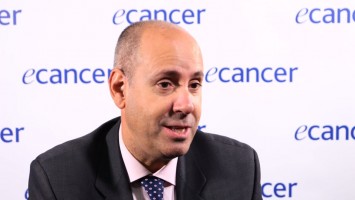Cisplatin versus doxorubicin/cyclophosphamide as neoadjuvant treatment in germline BRCA carriers with HER2-negative BC
Dr Nadine Tung - Beth Israel Deaconess Medical Center, Boston, USA
The INFORM trial was a multicentre randomised phase II neoadjuvant study for patients with germline BRCA mutations who had newly diagnosed HER2 negative breast cancer. The study was comparing neoadjuvant cisplatin to neoadjuvant doxorubicin and cyclophosphamide. The primary objective was to see whether the pCR rate with cisplatin was at least 20% higher than with AC. The rationale for the study was that when we wrote it back in 2012 there were data that certainly platinum was a very active agent in BRCA carriers with breast cancer and there was a neoadjuvant study from Poland that had shown a very high pathCR rate – 61%. This was much higher than retrospective data with AC showing a pathCR rate with 22%. So that was the purpose of the study.
The primary objective was pathCR rate and contrary to our expectations the pathCR rate with cisplatin was 18% and with AC was 26%. This was not significantly different but the risk ratio or chance of obtaining pathCR with cisplatin compared with AC was 0.7.
So one of the take-home messages was that the pathCR rate or the rate of RCB 0 and 1, which we also looked at, was not significantly higher with cisplatin than with AC in the BRCA carriers. It’s probably that BRCA deficiency or homologous recombination deficiency is more a marker of chemosensitivity to DNA damaging agents, whether it be platinum, anthracyclines or alkylators, rather than specifically a marker of sensitivity to platinum in particular.
What’s next for this study?
What’s coming next, of course is how to integrate PARP inhibitors into the treatment of BRCA carriers with breast cancer. We’re awaiting the results of large adjuvant trials; there are ongoing trials looking at it in the neoadjuvant setting. So I think at some point we’re going to have to either compare or figure out how to integrate chemotherapy and PARP inhibitors. What I think the INFORM trial does is to demonstrate that the regimen does not have to include or incorporate platinum, it doesn’t have to be a platinum containing regimen. Standard regimens are very, very good. Certainly a patient who has a contra-indication to an anthracycline I think a platinum-based regimen makes a lot of sense, particularly for triple negative disease. But the contribution here is to say that it doesn’t have to be a platinum-containing regimen.








